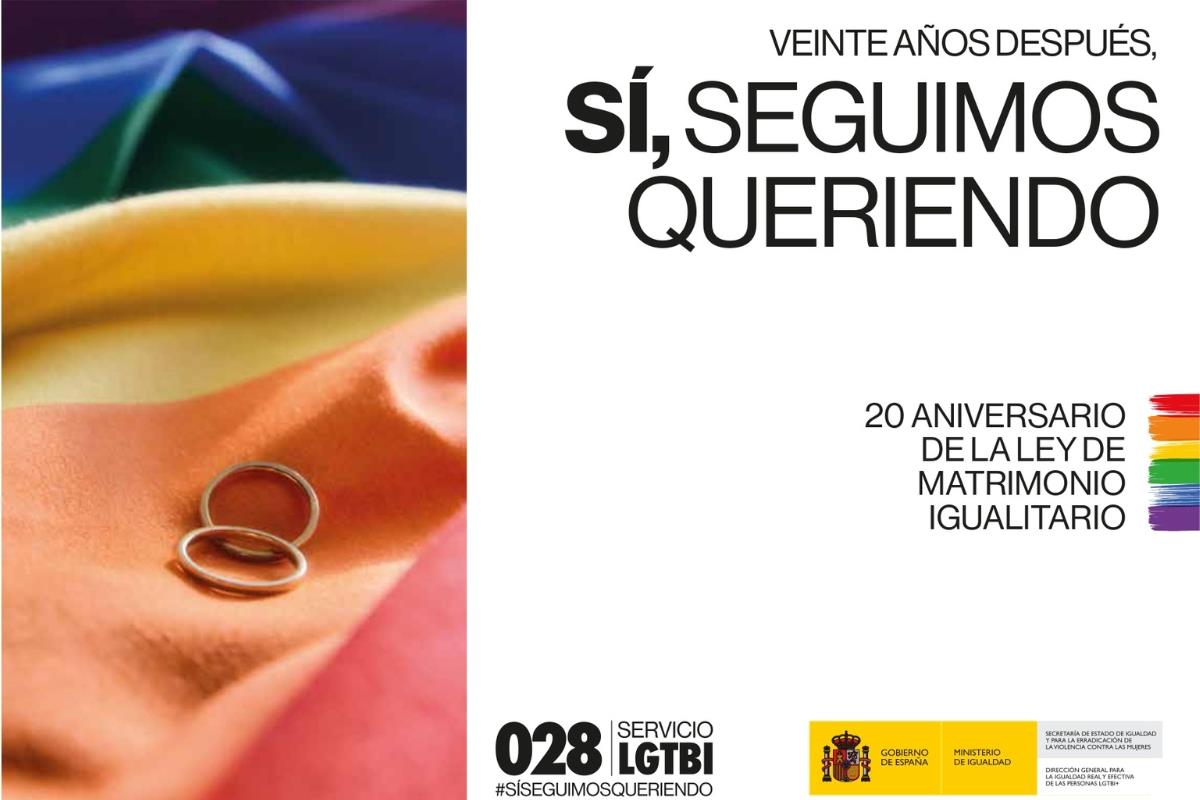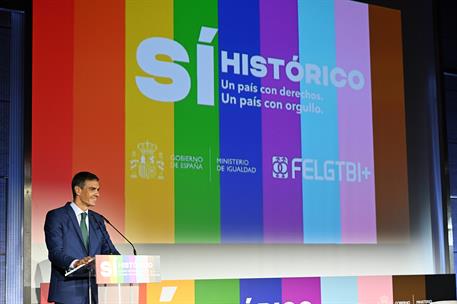 Campaign by the Ministry of Equality for the 20th anniversary of equal marriage in Spain
Campaign by the Ministry of Equality for the 20th anniversary of equal marriage in Spain
In the framework of the 20th anniversary of the approval of equal marriage in Spain, the Government celebrates International LGTBI Pride Day 2025 by reaffirming its commitment to fight discrimination on the basis of sexual orientation and gender identity and promote advances in LGTBI+ rights.
On 28 June, the International LGTBI (Lesbian, Gay, Trans, Bisexual and Intersex) Pride Day is celebrated all over the world, a day that aims to promote real and effective equality for LGTBI+ people and in which Spain participates actively every year.
In the framework of the 2025 celebrations, the Government has approved an institutional declaration and the Ministry of Equality has launched the campaign "20th anniversary of the Equal Marriage Law". Under the slogan #SíSeguimosQueriendo, this campaign seeks to celebrate sexual, gender and family diversity, and to raise awareness of public policies for the promotion and protection of the rights of LGTBI people.
This measure is part of the many advances in LGTBI+ rights achieved in Spain, which is already an international benchmark in this field.
What does International LGTBI Pride Day commemorate and when is it celebrated?
The Stonewall riots, which took place in 1969 in New York and are considered to mark the start of the modern struggle against discrimination on the basis of sexual orientation and gender identity, are commemorated worldwide on 28 June.
In 2018, Spain officially endorsed this celebration by establishing National LGBTI Pride Day on the same day.
For equality and against discrimination
The fight against discrimination, in favour of equality and in defence of LGTBI+ rights is based on articles 14 and 10.1 of the Constitution, as they recognise the right to full equality, dignity and free development of the personality.
At EU level, this is enshrined in the European Charter of Fundamental Rights, Article 21 of which prohibits discrimination on grounds of sexual orientation.
Commitment to the defence of LGTBI+ rights is not only about their inclusion in laws, but also about making those rights real and effective. This implies the definitive eradication of any discrimination based on sexual orientation, gender identity and expression or sexual characteristics. In Spain, incidents related to sexual orientation and gender identity are the second most reported hate crimes in Spain.
For this reason, the Government has established policies and support measures aimed at lesbian, gay, bisexual, trans, non-binary, intersex people and all those who do not fit into the traditionally established binary patterns of sex and gender.
LGTBI+ developments in Spain
The approval of equal marriage on 30 June 2005 was the first of a number of advances that have made Spain a global benchmark for the protection and recognition of LGTBI+ rights.
Adoption rights for same-sex couples, the gender identity law as well as the development of successive LGTBI+ rights laws or specific regulations on the rights of transgender people passed in 15 autonomous communities, continued the path of progress that has been completed in recent years with the following milestones:
- The comprehensive law on equal treatment and non-discrimination, which establishes a minimum common regulatory framework and contains basic guarantees under the Spanish anti-discrimination law.
- The law for real and effective equality of transgender people, which establishes a framework that obliges public authorities to activate measures to put an end to discrimination and to define public policies that guarantee LGTBI+ rights.
- In addition, several pieces of legislation have been passed which include among their objectives the protection of LGTBI+ rights: the law amending the education law; the law on the comprehensive protection of children and adolescents against violence; the new law on universities; the law on university coexistence; the employment law, which includes LGTBI+ people among the priority groups for employment policy; or the Order SND/1215/2021, which equalises access to assisted reproduction techniques for all women and transgender people with the capacity to carry a pregnancy
- Finally, the III Action Plan to Combat Hate Crimes 2025-2028, in line with previous plans, promotes best practices in policing to prevent and investigate these crimes and support victims from the groups most vulnerable to this type of crime, including the LGTBI+ community.
Boosting LGTBI+ rights in the EU and Spanish foreign policy
These measures have been adopted in accordance with the European Commission's "Strategy for LGBTIQ Equality 2020-2025", the first EU strategy for LGTBI+ equality.
At the European level, it should also be noted that during the Spanish Presidency of the Council of the EU in the second half of 2023, Madrid promoted the signing of the declaration "Advancing LGBTIQ rights in Europe", signed by 16 EU Member States as a call to continue making progress in the defence and promotion of the rights of LGTBI+ people.
Support for these rights can also be found in the priorities of Spanish foreign policy which, in recent years, has promoted actions in this area in multilateral forums such as the Human Rights Council, the Third Committee of the United Nations General Assembly, the United Nations LGBTI Core Group, the European Commission's High Level Group on Equality, Non-Discrimination and Diversity and the European Governmental LGBTI Focal Points Network (EFPN) within the framework of the Council of Europe.
The "Rainbow" telephone number: 028 victim support service
In addition to regulatory advances, other measures have also been implemented, such as the 028 telephone number. In operation since 2023, the 028 telephone number is a public service for victims of hate crimes and discrimination against LGTBI people with two objectives: to bring to light all the discrimination and violence that is still hidden and to provide help, assistance and resources to the victims of these crimes.
The "Arcoíris" telephone number is a 24-hour service provided by a team of specially trained professionals offering basic support, psychological and legal assistance. Calls are free, confidential, accessible to people with hearing and/or speech disabilities and are answered in all co-official languages, as well as in English and French.
The toll-free number chosen refers to 28 June, International LGTBI Pride Day, to make it easier to remember. The same service is also offered via email 028-online@igualdad.gob.es and an online chat.
Non official translation
More Info
- Aid from the Immediate Response, Reconstruction and Relaunching Plan
- Law 4/2023, of February 28, for the real and effective equality of trans people and for the guarantee of the rights of LGBTI people
- Law 15/2022, of July 12, comprehensive for equal treatment and non-discrimination
- European Commission: LGBTIQ Equality Strategy 2020-2025





